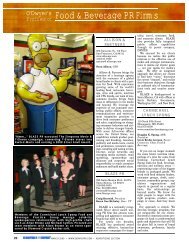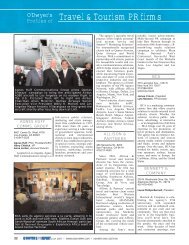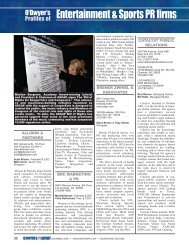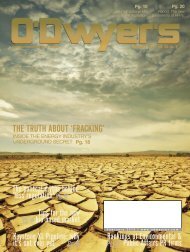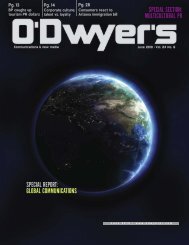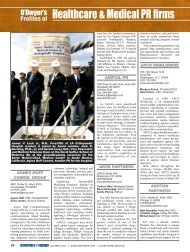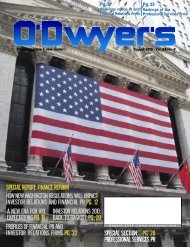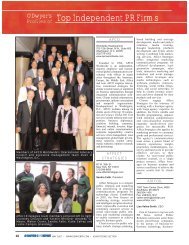PR Firm Rankings - Odwyerpr.com
PR Firm Rankings - Odwyerpr.com
PR Firm Rankings - Odwyerpr.com
You also want an ePaper? Increase the reach of your titles
YUMPU automatically turns print PDFs into web optimized ePapers that Google loves.
REPORT<br />
Bill grants public free access to federal research<br />
By Jon Gingerich<br />
Journalists, educators, marketers and a<br />
public looking for public access to<br />
scientific research may no longer<br />
have to pay costly fees or dig through countless<br />
library stacks for hard-to-find articles.<br />
Introduced in the House in April, the<br />
Federal Research Public Access Act would<br />
ensure free online access to federally funded<br />
research articles that have been published in<br />
peer-reviewed journals.<br />
Introduced by Rep. Mike Doyle (D-PA)<br />
and ac<strong>com</strong>panied by a number of bi-partisan<br />
co-sponsors, the purpose of the bill is to provide<br />
access and transparency to research<br />
funded by tax dollars. If passed, the public<br />
would have free online access to the published<br />
research funded by eleven U.S. federal<br />
agencies, including the Department of<br />
Defense, Department of Transportation, the<br />
Environmental Protection agency and the<br />
National Science Foundation, among others.<br />
The bill requires all federal departments<br />
and agencies with annual extramural<br />
research budgets of at least $100 million to<br />
create and store online versions of their final<br />
manuscripts in free digital repository accessible<br />
to the public. The bill requires all federally-funded<br />
manuscripts be placed online<br />
in less than six months after the article has<br />
been published.<br />
Academic journals are an $8-billion-ayear<br />
industry. Subscription costs to most<br />
journals are typically very expensive, with<br />
about 80% of a journal’s in<strong>com</strong>e <strong>com</strong>ing<br />
from subscriptions to academic or research<br />
libraries. Some have wondered that if this<br />
bill is passed — if users can bypass the need<br />
to pay for content — that many universities<br />
would drop their subscriptions altogether.<br />
This could result in financial trouble for the<br />
journal publishing industry or, at the very<br />
least, result in raised prices for future subscriptions.<br />
According to Heather Joseph, Executive<br />
Director of the Scholarly Publishing<br />
Academic Research Coalition, journals<br />
have remained prohibitively expensive<br />
without <strong>com</strong>petition from electronic <strong>com</strong>petitors,<br />
with current profit margins between<br />
20 and 40 percent. Journal subscribers have<br />
typically had no choice but to abide by the<br />
pricing controls set by the market.<br />
“The reason journal prices keep going up<br />
is because they can. The market for a journal<br />
doesn’t bear any resemblance to other<br />
consumer items you see,” Joseph said.<br />
“Right now journals are only accessible to<br />
people who can afford the subscriptions, and<br />
at this point they’re so expensive that even<br />
Harvard or Yale can’t afford to pay for all<br />
the journals they need.”<br />
“No one’s looking to put publishers out of<br />
business,” she continued. “We’re looking<br />
for a way to level the playing field. In a<br />
print-based world the old way of doing<br />
things made sense. In an Internet-based<br />
world we need to give the immediacy and<br />
availability of this information to the public.”<br />
Joseph said journalists, who will now<br />
have access to a host of free materials,<br />
would especially benefit from this bill.<br />
Scientific authors who aren’t paid for their<br />
work, by contrast, will benefit from subsequent<br />
citations, which results in tenure and<br />
further federal grants.<br />
“There are also advocacy groups and<br />
members of the public who stand to interest<br />
in the materials covered by this bill,” Joseph<br />
said, “like entrepreneurs and people who<br />
run small businesses who want research on<br />
green energy or alternative fuels and are<br />
interested in the stuff <strong>com</strong>ing out from the<br />
Department of Energy or the EPA.” <br />
24<br />
MAY 2010 WWW.ODWYER<strong>PR</strong>.COM



